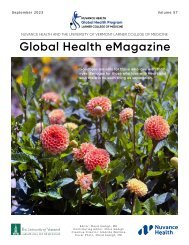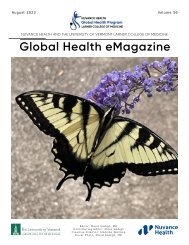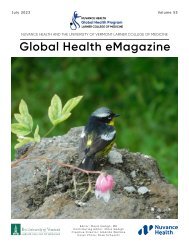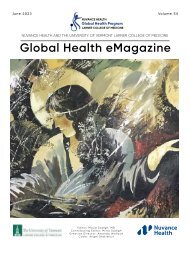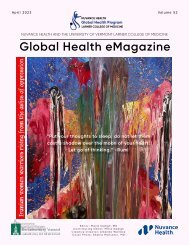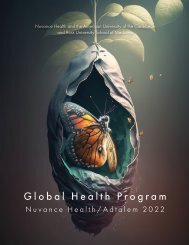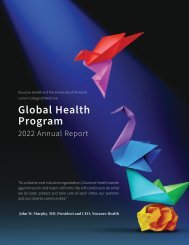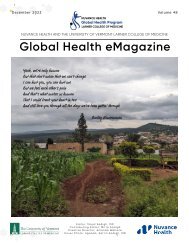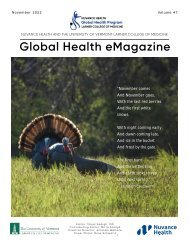eMagazine March 2023
You also want an ePaper? Increase the reach of your titles
YUMPU automatically turns print PDFs into web optimized ePapers that Google loves.
OUR PEOPLE,<br />
OUR MISSION<br />
Global Health<br />
<strong>eMagazine</strong><br />
<strong>March</strong> <strong>2023</strong><br />
Highlights<br />
Reviews<br />
GH Narrative<br />
Reflections<br />
Hispanic and Latinx Voices<br />
Global Local<br />
Voices of Ugandan<br />
Students<br />
Nursing Division<br />
Women’s Health Education<br />
Innovation and Technology<br />
Our Beautiful Planet<br />
Art to Remind Us of Who We<br />
Can Be<br />
A doctor visits people with infections including mpox during his morning rounds at the Yakusu<br />
General Hospital in Tshopo, Democratic Republic of the Congo.Credit: Arlette Bashizi/Reuters<br />
A World Health Organization (WHO) committee met earlier this week to decide<br />
whether the mpox outbreak — which began in May 2022 — is still a global publichealth<br />
emergency, and the agency could soon declare it over. The outbreak<br />
has subsided in countries including the United Kingdom and the United States,<br />
thanks to the deployment of vaccines and therapeutics, as well as changes in<br />
awareness and social behaviour. But the same is not true in some nations in West<br />
and Central Africa, which have been battling the monkeypox virus for decades,<br />
and where the disease’s toll has historically been highest.<br />
Even while global mpox infections have plummeted from more than 1,000<br />
new infections a day at their peak to fewer than 70, numbers have not fallen<br />
substantially in African countries. The Democratic Republic of the Congo (DRC),<br />
for instance, has reported more than 1,000 suspected cases since October. But<br />
even those numbers are a “gross underestimation” of reality, says Dimie Ogoina,<br />
an infectious-disease physician at Niger Delta University in Amassoma, Nigeria.<br />
Many infections are never confirmed because of an underfunded testing and<br />
virus-surveillance system.<br />
Article of the Month<br />
You’re Invited<br />
Photo News<br />
Calendar<br />
Global Health Family<br />
Resources<br />
Previous Issues of<br />
the <strong>eMagazine</strong><br />
A woman and her child await treatment for<br />
monkeypox at a facility run by Doctors Without<br />
Borders in the Central African Republic in 2018.Credit:<br />
Charles Bouessel/AFP/Getty<br />
A man receives a vaccine at a monkeypox<br />
clinic in Montreal, Canada, on 6 June.<br />
Credit: Christinne Muschi/Reuters<br />
Link to the article:WHO may soon end mpox emergency — but outbreaks rage in<br />
Africa<br />
40





